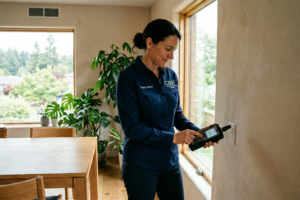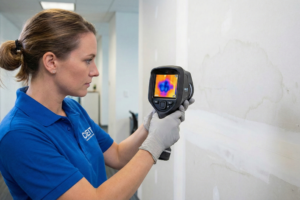
Why Radon Matters in Indoor Environments
Radon, a naturally occurring radioactive gas, is often overlooked in discussions about indoor air quality (IAQ). However, its presence in homes and businesses can pose significant health risks, making it a crucial element to manage effectively.
Understanding the Health Impacts of Radon
1. Invisible and Odorless: Radon is undetectable without specialized testing – you cannot see, smell, or taste it.
2. Major Health Risk: Prolonged exposure to high levels of radon is the second leading cause of lung cancer after smoking, as reported by the U.S. Environmental Protection Agency (EPA).
3. Widespread Occurrence: Radon can be found in any building, new or old, and is more concentrated in areas where the geological conditions produce more radium in the soil.
The Role of IAQ Testing in Radon Management
Regular radon testing is essential in managing its risks. Certified Indoor Air Quality Testing Technicians (CIAQTT) can conduct thorough radon testing in various indoor environments. Understanding the levels of radon present is the first step in mitigation and risk management.
Radon Mitigation Strategies
If high levels of radon are detected, there are several effective mitigation strategies:
- Increasing Ventilation: This can help reduce radon levels, especially in basements and lower floors where radon typically accumulates.
- Sealing Cracks in Floors and Walls: Reducing the entry points for radon from the soil into the building can significantly lower its concentration indoors.
- Radon Mitigation Systems: Professional installation of radon mitigation systems can effectively reduce radon levels.
External Resources for Radon Information:
These resources provide comprehensive information about radon, its health implications, and safety guidelines.
Conclusion
Understanding the significance of radon in indoor environments is crucial for maintaining healthy living and working spaces. Regular testing and effective mitigation strategies are key in managing this invisible threat. Homeowners and business owners are encouraged to consult IAQ-certified professionals to ensure their environments are safe from the dangers of radon.



